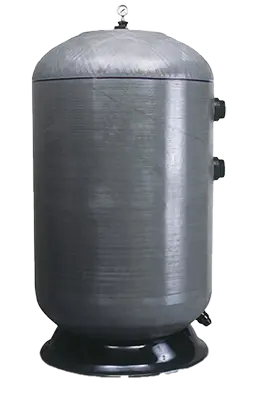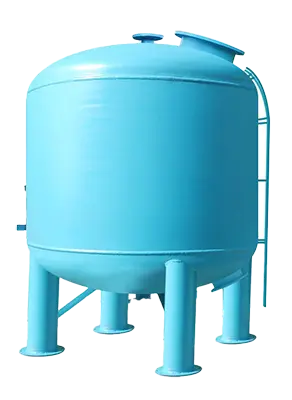Choosing the right filter vessel is crucial for system efficiency and safety. With growing environmental awareness and advances in technology, users now have more options due to the diversity of materials and optimized performance. Fiberglass (FRP) and carbon steel are two main filter vessel materials, each with unique advantages and applications. This article will explore the basic characteristics of these materials, their suitable scenarios, and their benefits in water treatment processes to help users make informed decisions.
Fiberglass (FRP) is an advanced composite material known for its excellent performance and wide range of applications. Here, we will explore the key characteristics of fiberglass filters, including their strength, corrosion resistance, temperature stability, and insulation properties, highlighting their important role in the water treatment industry.

Fiberglass is made from glass fibers reinforced with resin. This combination gives it high strength, light weight, and corrosion resistance, making it ideal for water treatment, chemical storage, and marine applications. Its design flexibility allows it to be shaped into various sizes and forms.
Fiberglass has a higher specific strength (strength-to-weight ratio) than many metals, meaning it is lighter while maintaining the same strength. Specifically, its density is about one-fourth that of carbon steel, making transportation and installation easier. This lightweight property also reduces support structure requirements, cutting construction costs and time.
Fiberglass is highly resistant to corrosion, able to withstand acids, bases, salts, and various chemicals in water. For example, in treating acidic or alkaline wastewater and chemical storage, fiberglass filters excel by avoiding the corrosion issues common with traditional metals over time. This makes it particularly effective in high-salinity or corrosive water environments.
Fiberglass maintains stable physical and chemical properties across a wide temperature range. It can operate effectively from -40°C to +80°C, ensuring filtration performance is not affected by temperature changes.
As a good insulator, fiberglass has excellent electrical insulation properties, making it important in water treatment systems where preventing electrochemical corrosion is crucial. This feature enhances equipment safety and lifespan, especially in the electrical and chemical industries.
Carbon steel is a traditional filter material that holds an important position in the water treatment industry due to its good mechanical properties and cost-effectiveness. Here, we will focus on the key characteristics of carbon steel filters, including their high strength, wear resistance, corrosion resistance, and thermal stability, showcasing their advantages and suitability for various water treatment applications.

Carbon steel contains a higher carbon content, providing good mechanical performance and chemical stability. It is suitable for long-term use in high-pressure and complex environments.
Carbon steel filters can withstand high working pressures and harsh conditions. Their high strength ensures they won’t crack or leak over time, ensuring reliable filtration. Additionally, their toughness helps them resist cracking under impact.
Carbon steel has high hardness and wear resistance, making it suitable for filtering water with solid particles. This quality extends the filter's lifespan and lowers maintenance costs, particularly in wastewater treatment or water sources with high solid content.
While carbon steel is less corrosion-resistant than stainless steel, surface treatments and coatings can significantly enhance its performance. Techniques like hot-dip galvanizing and painting provide extra protection and allow for aesthetic adjustments.
Carbon steel maintains its structure and performance in high-temperature environments, making it suitable for high-temperature processes and hot water treatment. It retains its mechanical properties in various complex settings.
Understanding how these materials perform in real-world applications is vital for selecting the right filter. Here’s a comparison of their applications.
Acidic and Alkaline Wastewater Treatment: Its corrosion resistance makes it ideal for chemical plants and pharmaceuticals.
Chemical Storage: Suitable for storing corrosive chemicals with minimized leakage risks.
Drinking Water Treatment: Its hygienic properties make it a common choice for potable water filtration.
Industrial Water Treatment: Effective for treating industrial wastewater with solid particles.
High-Temperature Water Treatment: Performs well in hot water boilers and circulation systems.
Mining and Oil Industry: Commonly used in water treatment systems within mining and oil extraction, known for good pressure resistance.
When selecting water treatment equipment, it is essential to consider the characteristics and application scenarios of both fiberglass and carbon steel. Fiberglass, with its superior corrosion resistance and lightweight properties, is well-suited for handling highly corrosive water sources. In contrast, carbon steel performs better with non-corrosive or low-corrosive media. To ensure the efficient and safe operation of water treatment systems, users should choose the most appropriate filter material based on specific application needs and environmental conditions.

 English
English Español
Español русский
русский